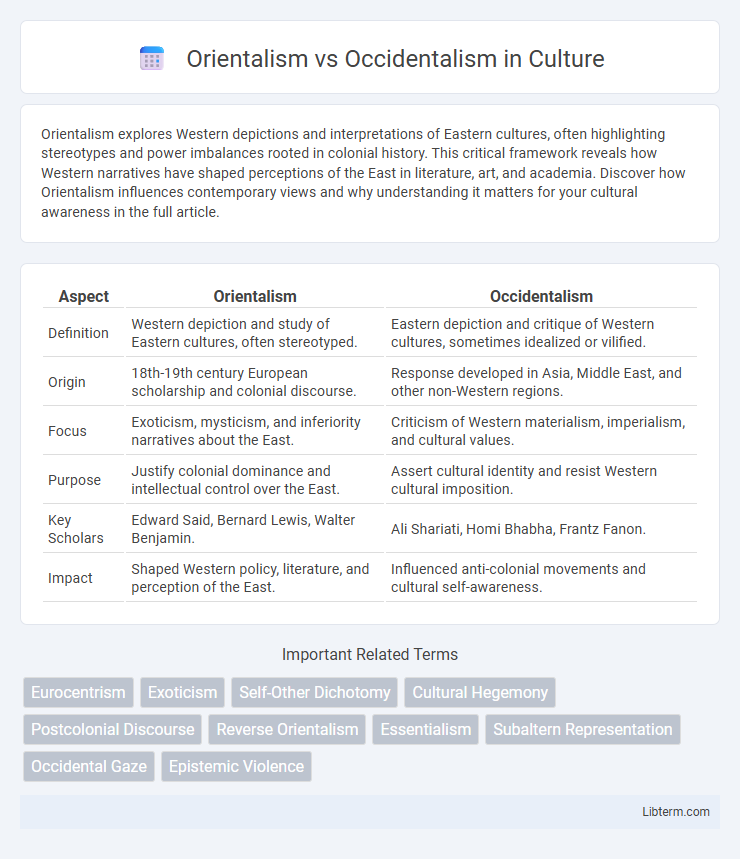Orientalism explores Western depictions and interpretations of Eastern cultures, often highlighting stereotypes and power imbalances rooted in colonial history. This critical framework reveals how Western narratives have shaped perceptions of the East in literature, art, and academia. Discover how Orientalism influences contemporary views and why understanding it matters for your cultural awareness in the full article.
Table of Comparison
| Aspect | Orientalism | Occidentalism |
|---|---|---|
| Definition | Western depiction and study of Eastern cultures, often stereotyped. | Eastern depiction and critique of Western cultures, sometimes idealized or vilified. |
| Origin | 18th-19th century European scholarship and colonial discourse. | Response developed in Asia, Middle East, and other non-Western regions. |
| Focus | Exoticism, mysticism, and inferiority narratives about the East. | Criticism of Western materialism, imperialism, and cultural values. |
| Purpose | Justify colonial dominance and intellectual control over the East. | Assert cultural identity and resist Western cultural imposition. |
| Key Scholars | Edward Said, Bernard Lewis, Walter Benjamin. | Ali Shariati, Homi Bhabha, Frantz Fanon. |
| Impact | Shaped Western policy, literature, and perception of the East. | Influenced anti-colonial movements and cultural self-awareness. |
Defining Orientalism and Occidentalism
Orientalism refers to the Western study, representation, and portrayal of Eastern cultures, often characterized by stereotypical and exoticized depictions that reinforce power imbalances. Occidentalism is the reverse phenomenon, where Eastern perspectives critique and generalize Western societies, frequently highlighting perceived cultural imperialism and materialism. Both concepts involve constructed binaries that shape intercultural relations and influence global political discourse.
Historical Origins and Development
Orientalism originated in the late 18th century as a scholarly and artistic framework in Europe to study and represent Asian cultures, often embedding colonial power dynamics and stereotypes. Occidentalism developed later as a reactive ideology in non-Western societies, critiquing and opposing Western cultural dominance and political influence from the 19th century onward. Both concepts evolved through historical interactions shaped by imperialism, nationalism, and cultural identity formation across the East-West divide.
Key Theorists and Their Contributions
Edward Said's seminal work "Orientalism" critiques Western depictions of the East, highlighting how imperialist ideologies shape cultural representations. In contrast, Occidentalism explores Eastern critiques of the West, with theorists like Ian Buruma and Avishai Margalit analyzing how Western modernity is perceived as oppressive or alien. Both frameworks underscore power dynamics in cross-cultural perceptions, revealing the mutual construction of identities and stereotypes through historical and political contexts.
Stereotypes and Cultural Representations
Orientalism stereotypes the East as exotic, backward, and mystical, often constructing a monolithic image that serves Western hegemonic interests and justifies colonial dominance. Occidentalism, in contrast, portrays the West as arrogant, materialistic, and morally corrupt, reflecting a reactive identity shaped by political and cultural resistance. Both frameworks rely on simplified cultural representations that reinforce binary oppositions, limiting mutual understanding and perpetuating ideological biases.
Power Dynamics in Knowledge Production
Power dynamics in knowledge production between Orientalism and Occidentalism reveal entrenched asymmetries where Orientalism historically positioned Western scholarship as authoritative over Eastern cultures, framing them through exoticism and hegemony. Occidentalism counters this by exposing and resisting Western dominance, critiquing the construction of Western identity as superior and highlighting the reciprocal influence between East and West in shaping global narratives. This interplay underscores how control over knowledge shapes geopolitical power and cultural representation on a global scale.
Impact on Art, Literature, and Media
Orientalism and Occidentalism reshape artistic, literary, and media narratives by framing cultural identities through distinct lenses of power and exoticism; Orientalism often romanticizes Eastern cultures, influencing Western art and literature with stereotypical motifs and themes, while Occidentalism critiques Western dominance, inspiring counter-narratives and alternative representations in Eastern media and texts. The interplay between these perspectives catalyzes diverse expressions in global cinema, visual arts, and literary works, challenging or reinforcing cultural stereotypes and fostering cross-cultural dialogues. Significant examples include Edward Said's critique in literature, graffiti art movements in the Middle East responding to Western portrayals, and films like "Slumdog Millionaire" and "The Battle of Algiers" that explore postcolonial tensions shaped by these ideologies.
Political and Social Implications
Orientalism shapes Western political dominance by perpetuating stereotypes that justify intervention and colonialism in Eastern societies, reinforcing power imbalances. Occidentalism, as a counter-narrative in Eastern contexts, critiques Western cultural imperialism and often fuels nationalist or anti-Western sentiments that influence domestic and foreign policy. These reciprocal ideologies impact global diplomatic relations and contribute to ongoing social identity constructions within both Western and Eastern communities.
Critiques and Controversies
Orientalism, as critiqued by Edward Said, perpetuates stereotypes and justifies Western dominance by constructing the East as exotic and inferior, leading to cultural misrepresentation and political domination. Occidentalism, as a counter-discourse, sometimes mirrors these essentialist tendencies by portraying the West as culturally or morally corrupt, fueling mutual misunderstandings and reinforcing binary oppositions. Both frameworks face controversy for oversimplifying complex identities and histories, often ignoring internal diversity and power dynamics within the represented regions.
Contemporary Relevance and Manifestations
Contemporary relevance of Orientalism and Occidentalism is evident in global media portrayals, political rhetoric, and cultural exchanges, which often perpetuate stereotypical narratives and power imbalances between East and West. Orientalism continues to influence Western perceptions of Asia and the Middle East, shaping foreign policy and tourism, while Occidentalism manifests in resistance movements and political critiques within these regions, challenging Western dominance and cultural imperialism. The ongoing digital age amplifies both frameworks, enabling rapid dissemination of these ideologies through social media, literature, and film, affecting international relations and identity politics worldwide.
Bridging the Gap: Towards Mutual Understanding
Orientalism and Occidentalism represent contrasting perspectives that shape cultural and political identities through fictionalized narratives about the 'Other.' Bridging the gap requires nuanced dialogue that acknowledges historical biases, promotes empathetic engagement, and highlights shared human experiences across East-West divides. Emphasizing intercultural education and collaborative scholarship fosters mutual understanding and counters stereotypes perpetuated by Orientalist and Occidentalist frameworks.
Orientalism Infographic

 libterm.com
libterm.com